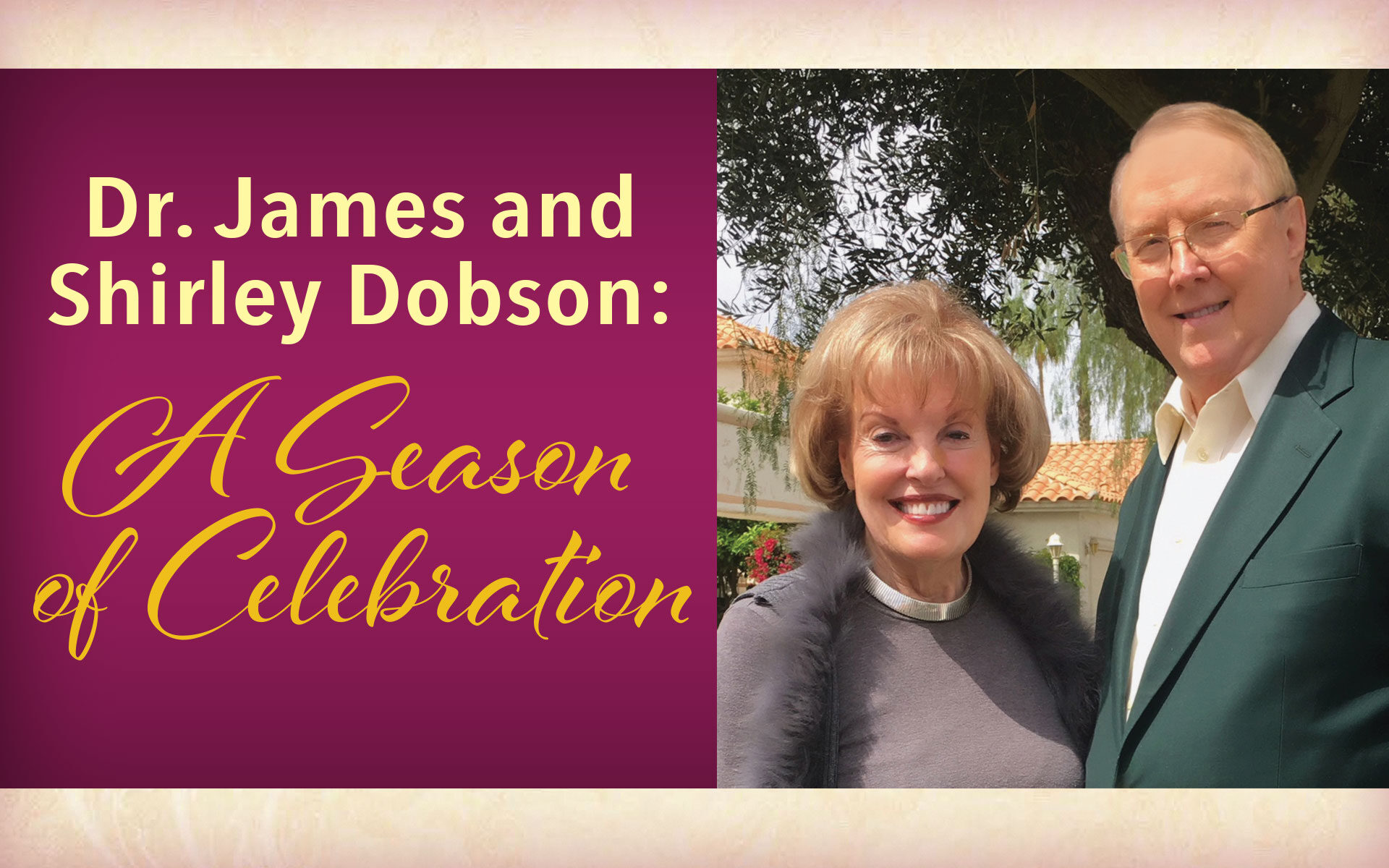
Dear Friends,
February 14th is a day set aside each year to celebrate love. Traditionally, it occurs when a man pauses to express his love and appreciation for the woman he cherishes romantically. Today, I want to focus on Valentine's Day and expand it to consider the institution of marriage itself, and what it means for the well-being of our culture.
Marriage is one of the Creator's most marvelous and enduring gifts to humankind. This divine plan was revealed to Adam and Eve in the Garden of Eden, and then described succinctly in Genesis 2:24, where we read, "For this cause, a man shall leave his father and mother and cleave to his wife, and they shall be one flesh." With those 22 words, God announced the ordination of the family, long before He established the two other great human institutions, the church and the government.
More than 5,000 years have come and gone since that point of origin, yet every civilization in the history of the world has been built upon it.1 Despite today's skeptics who claim that marriage is an outmoded and narrow-minded Christian concoction, the desire of men and women to "leave" and "cleave" has survived and thrived through times of prosperity, famine, wars, peace, epidemics, and every other possible circumstance and condition. It has been the bedrock of culture in Asia, Africa, Europe, North America, South America, Australia, and even the Arctic. Given this history, one might begin to suspect that something mystical within human nature must be drawing the sexes together, not just for purposes of reproduction, as with animals—but to satisfy an inexpressible longing for spiritual bonding. Indeed, how can it be doubted? Clearly, our loving Creator placed the desire for intimacy and companionship deep within men and women—and called their love for each other, "one flesh."
Admittedly, there have been periods in history where homosexuality has flourished, including the biblical cities of Sodom and Gomorrah, and others in ancient Greece and the Roman Empire. None of these civilizations survived. Furthermore, even where sexual perversion was tolerated, the institution of marriage continued to be honored in law and custom. Only in the last few years has what is now referred to as "gay marriage" been given equal status with biblical male-female unions.2 The impact of that vast sociological experiment is no longer speculative.
We can see where that leads by observing what happened in Scandinavian nations—Norway, Denmark, and Sweden—when their leaders were the first to embrace de-facto marriages between homosexuals in the 1990s. The consequences for traditional families were devastating. The institution of marriage in those countries began dying, with most young couples cohabiting or choosing to remain single. More than 80 percent of children in some areas of Norway were and continue to be born out of wedlock.3 It appears that tampering with the ancient plan for males and females spells eventual doom for the family and for everything related to it.
We are now seeing the disintegration of marriage on a large scale, along with the alarming descent of the birth rate in most Western nations. Indeed, everything related to "family" has fallen on hard times. This spells bad news for the stability of entire cultures.
One of the reasons the preservation of the family is critical to the health of nations is the enormous influence the sexes have on each other. They are specifically designed to "fit" together, both physically and emotionally, and neither is entirely comfortable without the other. There are exceptions, of course, but this is the norm.
George Gilder, the brilliant sociologist and author of the book, Men and Marriage, states that women hold the key to the stability and productivity of men.4 When a wife believes in her husband and deeply respects him, he gains the confidence necessary to compete successfully and live responsibly. She gives him a reason to harness his masculine energy—to build a home, obtain and keep a job, help her raise their children, remain sober, live within the law, spend money wisely, etc. Without a positive feminine influence, his tendency is to release the power of testosterone in a way that is destructive to himself and to society at large.
We see Gilder's insight played out in the inner city. Our welfare system, in the aftermath of the Great Society programs, rendered millions of men superfluous. Indeed, government assistance to women and children was reduced or denied when a father was present in the home. Food stamps put groceries in the pantry. The Department of Housing and Urban Development sent repairmen to address maintenance problems. When children were in trouble, social workers stepped in to help. Thus, men became unnecessary beyond the act of impregnation. Who needed 'em? Gilder contends that this disengagement of men from women and their children explains why drug abuse, alcoholism, crime, and absentee fathers have been rampant in inner-city settings. Men were separated from their historic role as providers and protectors, which stripped them of masculine dignity and robbed them of meaning and purpose. Thus, as Gilder said, their energy became a destructive force instead of empowering growth and personal development.5
Stated positively, men have a deep-seated need for women, which is why the bonding that occurs between the sexes is so important to society as a whole. Successful marriages have a "civilizing" influence on men that is not only in the best interests of women, but is vital for the protection and welfare of children.
Just as men are dependent upon women for stability, women, for their part, have deep longings for romantic fulfillment that can best be satisfied by a committed relationship with a man. Their sense of self-worth, contentment, and fulfillment are typically derived, at least in part, from heart-to-heart intimacy in marriage. Unfortunately, most young husbands find these emotional needs in their wives to be not only confusing, but downright baffling at times. That was certainly true of my early relationship with my wife, Shirley. It took me several years after we were married before I began to "get it." We experienced some bumps in the road while I was getting things sorted out.
The most eye-opening encounter between us occurred on our first Valentine's Day together, six months after we were married. You could call it one of my biggest mistakes. I had gone to the USC library that morning and spent eight or ten hours poring over dusty books and journals. I had forgotten that it was February 14th. What was worse, I was oblivious to the preparations that were going on at home. Shirley had cooked a wonderful dinner, baked a pink, heart-shaped cake with "Happy Valentine's Day" written on the top, placed several red candles on the table, wrapped a small gift she had bought for me, and then she wrote a little love note on a greeting card. The stage was set. She would meet me at the front door with a kiss and a hug. But there I sat on the other side of Los Angeles, blissfully unaware of the storm that was gathering overhead.
About 8:00 p.m., I was hungry and ordered a hamburger at the University Grill. After eating, I moseyed out to where my Volkswagen was parked and headed toward home. Then I made a terrible mistake that I would regret for many moons. I stopped by to see my parents who lived near the freeway. Mom greeted me warmly and served up a great slice of apple pie. That sealed my doom.
When I finally put my key in the lock at 10:00 p.m., I knew instantly that something was horribly wrong. I'm very perceptive about subtleties like that. The apartment was almost dark and all was deathly quiet. Shirley was in bed with the covers pulled around her head. On the table was a coagulated dinner still sitting in our best dishes and bowls. Half-burned candles stood cold and dark in their silver-plated holders. It appeared that I had forgotten something important. But what? Then I noticed the red and white decorations on the table. "Oh no!" I thought.
So, there I stood in the semi-darkness of our little living room, feeling like a jerk. I didn't even have a card, much less a thoughtful gift for Shirley. No romantic thoughts had crossed my mind all day. I couldn't even pretend to want the dried-out food that sat before me. After a brief flurry of words and a few tears, Shirley went back to bed and her hurt and disappointment were impossible to miss. I would have given a thousand dollars for a true, plausible explanation for where I'd been. There just wasn't one. It didn't help to tell her, "I stopped by to see my parents and ate a piece of great apple pie. It was wonderful. You shoulda been there."
Fortunately, Shirley is not only a romantic lady, but a forgiving one, too. We talked about my thoughtlessness later that night and came to an understanding. I learned a big lesson that Valentine's Day and determined never to forget it. I'll bet, however, that I'm not the only brute who has underestimated the importance of February 14th. There must be several million guys who can identify with my oversight.
Once I learned more about how my wife differed from me—especially regarding romantic matters—I began to get with the program. One day, I came home from work and asked Shirley to join me for a date that I called "Old Haunts." I took her to many of the places we had visited when we were dating in college. We walked through the Farmers Market and then ate pizza at Miceli's Italian restaurant in Los Angeles, where I had taken this beautiful girl on our first date. We drove by the Pasadena Playhouse, where we had seen a theater performance on our second date. We then strolled along, hand-in-hand, reminiscing about times gone by. It was a wonderful afternoon and evening together, and I assure you, Shirley loved it.
What I was beginning to understand in those early days were the ways my wife was uniquely crafted, and how I alone could meet her most important emotional needs. Shirley was also learning some things about me. She observed that I needed her to respect me, to believe in me, and to listen to my hopes and dreams. Shirley said all the right things, not because she was trying to manipulate me, but because she clearly believed them. She would often tell me, "I am proud of you, and I'm glad to be part of your team! It is going to be exciting to see what God will do with us in the days ahead." The way she looked up to me gave me confidence as a student who had never really accomplished anything to that point. It empowered me to take risks professionally, and to reach for the sky. She was meeting a critical need for me, precisely in the way George Gilder described. I was then motivated to give Shirley what she needed from me.
We have now been married for more than 58 years, and it has been a great ride. I can't imagine life without her, and I'm thankful she feels the same about me. I know marriage doesn't always work that successfully, but that is the way it was designed to be. When the predominant needs of one sex go unmet or ignored by the other, something akin to "soul hunger" occurs, primarily in women. It cannot be explained by cultural influences that are learned in childhood, as important as they are. There is something more fundamental that is deeply rooted in the human personality. That observation was confirmed for me, time and again, in my professional work as a psychologist, where I have observed those same patterns in couples with whom I have counseled. There is a divine plan in human nature that suits men and women for one another.
In short, marriage, when it functions as intended, is good for everyone—for men, women, children, the community, the nation, and the world. Those who are gay or lesbian have the right to commit to one another in any way they choose, but their relationship is a form of counterfeit marriage. Research shows consistently that heterosexual married adults do better in virtually every measure of emotional and physical health than people who are divorced or never married.6 They live longer and have happier lives.7 They recover from illness more quickly, earn and save more money, are more reliable employees, suffer less stress, and are less likely to become victims of violence.8 They find the job of parenting more enjoyable, and they have more satisfying and fulfilling sex lives.9 These and countless other benefits of marriage serve to validate the wisdom of the Creator who told us what was best for humankind. He said in the Book of Genesis, "It is not good for the man to be alone" (2:18 NIV). So, he made Adam a helpmate, a partner of the opposite sex, a lover—and then commanded them to "be fruitful and multiply." What a great plan! We will depart from it at our peril.
This is why I am deeply concerned today about the effort to tamper with this time-honored institution. For nearly 60 years, the homosexual activist movement and related entities have been working to implement a master plan that has as its centerpiece the weakening or destruction of the family.10 Now, the final battle is at hand. The institution of marriage, along with an often weakened and impotent church, is all that stands in the way of its achievement of every coveted aspiration. Those goals include universal acceptance of the gay lifestyle, the discrediting of Scriptures that condemn homosexuality, muzzling of the clergy and Christian media, granting of special privileges and rights in the law, overturning laws prohibiting pedophilia, and the indoctrination of children and future generations through public education. Legalized pedophilia and polygamy could be around the corner.
These radical objectives that seemed unthinkable just a few years ago have largely been achieved, or are now within reach. All that remains is for the LGBT movement and its friends in the media, the entertainment industry, the professions, the government, the universities, and the military to deliver a coup de grace to a beleaguered institution of the family. Those of us in North America and Europe are not simply Slouching Towards Gomorrah, as Judge Robert Bork warned in his best-selling book;11 we are hurtling toward it.
I believe we can still turn the tide, but it won't be easy. The majority of Americans want marriage to survive. But we need a moral and spiritual awakening from the cultural miasma into which we have sunk. And we need it now!
In conclusion, let me explain why I have chosen to address again the welfare of marriage and the family. It is hardly a new theme for me. My story goes back more than four decades when I was a young professor engaged in very rewarding and exciting research. I could have been happy working in academia for many years. At that time, however, I became increasingly alarmed by what I saw happening to my country. The fabric of American life was unraveling under pressure from social engineers who had a radically different design for parents and their children. These revolutionaries seemed to be everywhere after the upheaval of the 1960s. They insisted that America needed to be fundamentally transformed. That was long before Barack Obama preached this same message during his first presidential campaign.
Neither he, nor the liberal community, has explained to us why anyone would want to transform the most successful nation in the history of the world. We now know it had everything to do with socialism, wealth and power, the sexual revolution, and hostility toward historic biblical teachings. I opposed every aspect of that movement then and what it has now become. I wrote about it in my first book, Dare to Discipline, which is still in print today.
Going back to 1977, I began to hear a "new calling." It urged me to do what I could to help strengthen and preserve the institutions of marriage and parenting. I resigned from the university and started the work that continues with vigor today. It is called James Dobson Family Institute (JDFI), and it is still our raison d'etre—our reason for being.
YOU and millions of other generous people have identified with this cause and have supported it for many years. What we are doing at JDFI now is more desperately needed than ever before. It is heartbreaking to see what public schools in liberal states are doing to children as young as kindergarten age. Can you imagine middle-school boys and girls showering together at school? And as we have seen, marriage is on the ropes and biblical morality is being mocked and undermined.
Those are the issues, plus the sanctity of human life, that drive us today. I can't tell you how much I appreciate your standing with us. Our board is busily redesigning the ministry so that it will continue long after my time on this earth. You can be sure that the battle to save the family will need all the help it can get as the civil war of values heats up. We must pray for it, and for the young parents who are struggling to raise their children in a shock-wave world.
Thank you for taking this journey with us.
Blessings to you all,

1. Edward Westermarck, The History of Human Marriage (New York: Allerton Book Company, 1922).
2. "Marriage and the Constitution: What the Court Said and Why It Got It Wrong," by Ryan T. Anderson, July 3, 2015. RealClearPolitics.com.
3. Stanley Kurtz, "Death of Marriage in Scandinavia," Boston Globe, 10 March 2004, A23.
4. George Gilder, Men and Marriage (Gretna, LA: Pelican Publishing Company, 1986), 62-63.
5. Ibid.
7. Ibid.
8. Ibid.
9. Ibid.
10. Charles W. Socarides, MD, A Freedom Too Far (Phoenix, AZ: Adam Margrave Books); Marshall K. Kirk and Erastes Pill, "The Overhauling of Straight America," Guide, November 1987.
11. Robert H. Bork, Slouching Towards Gomorrah: Modern Liberalism and American Decline (New York: Regan Book, 1997).
This letter may be reproduced without change and in its entirety for non-commercial and non-political purposes without prior permission from Family Talk. Copyright, 2019 Family Talk. All Rights Reserved. International Copyright Secured. Printed in the U.S. Dr. James Dobson’s Family Talk is not affiliated with Focus on the Family.








